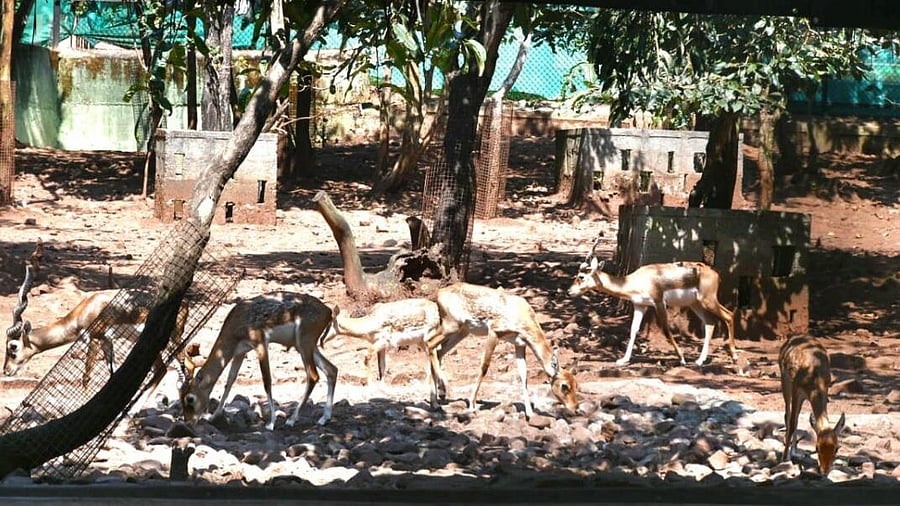
Black bucks at the zoo in Belagavi
Credit: DH File Photo
Hubbali: Lab reports on Tuesday confirmed that the 31 blackbucks that died at Rani Channamma Mini Zoo in Belagavi were due to Haemorrhagic Septicaemia (HS), a bacterial disease.
Speaking to DH, Member Secretary, Zoo Authority of Karnataka Sunil Punwar said that the viscera of the animals that died on November 13 were sent to Bengaluru lab and they have confirmed the death of blackbucks were due to HS.
He said HS is a highly contagious and deadly disease affecting herbivores. The zoo officials are still investigating on the means through which the blackbucks could have contracted the infection that impacts the breathing and causes high fever among cattle. If not treated, the infection could result in the death of animal within 8-12 hours.
Punwar confirmed that seven other surviving blackbucks were also infected by HS and are recovering and responding positively to the treatment. “In the last 36 hours the zoo has not reported any casualty of animals. However, we are still not out of woods, as the medical staff and the officials are closely monitoring the health of not just the seven blackbucks but also 191 animals at the zoo.”
“If there was any foul-play like supplying of infected fodder to zoo then even other herbivorous should have been impacted, which is not the case here. There is no wide spread of HS infection in the surrounding areas of zoo. So, we are unable to pinpoint on the exact reason for the deaths,” he said.
Belagavi Chief Conservator of forests (CCF) Manjunath Chavan said disinfectants is being sprayed in the enclosures of the blackbucks and surrounding ones to ensure that the bacterial infection does not spread to other animals.
Experts suspect that blackbucks, a highly sensitive animal, could have contracted the infection due to sudden change in the climatic condition.
National Animal Disease Referral Expert System (NADRES), an unit of Indian Council of Agricultural Research (ICAR) -National Institute of Veterinary Epidemiology & Disease Informatics (NIVEDI), Bengaluru, in its September ‘Vet alert’ had issued a warning of possible outbreak of the HS in Belagavi region based on the earlier year data and sudden fall in the temperature in the area. However, that warning was provided to the animal husbandry department.
Speaking to DH, NIVEDI, Bengaluru director Baldev Raj Gulati said his institute provides regular update on possible disease attack among cattle and they had issued alert to the animal husbandry department regarding the possible spread of HS in Belagavi due to prevailing climatic condition. He categorically denied issuing any such warning to the forest department.
Belagavi ACF Nagaraj Balehosur said usually they get such alerts of HS spread during January. “We did not receive any warning from animal husbandry department for November. There was one alert, however, that was for January 2026.”
Chavan ruled out negligence of medical staff for the spread of disease. He said the same set of doctors and staff are providing care to the animals for the last three years and there has not be single such incident reported earlier.